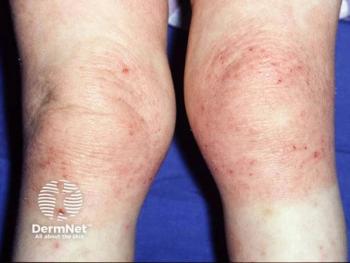
Disease Severity's Influence on Atopic Dermatitis Therapeutic Selection
Dr. Golant discusses the role of disease severity in her selection of atopic dermatitis treatments, particularly noting the characterization of hand and foot involved patients as often moderate cases, and highlighting the rapid response observed in these areas when treated.
Episodes in this series

This is a video synopsis of a discussion involving Alexandra Golant, MD, Assistant Professor at the Icahn School of Medicine at Mount Sinai, focusing on therapeutic approaches for atopic dermatitis (AD), particularly in cases involving hand and foot involvement.
Dr. Golant highlights the importance of assessing AD severity to determine appropriate therapeutic options, distinguishing between patients manageable with topical therapy and those requiring systemic treatment for disease control. She identifies patients with hand and foot involvement as examples of moderate AD due to high impact on quality of life, despite lower body surface area involvement.
In her practice, Dr. Golant observes remarkable responses to systemic therapies in hand and foot AD, with rapid disease control, skin clearance, and itch reduction. She notes that hands and feet may clear before other body parts, making them favorable areas for systemic treatment.
Regarding systemic options for hand and foot AD, Dr. Golant discusses available biologics, including dupilumab (IL-4 and IL-13 blocker) and tralokinumab (IL-13 blocker), as well as Janus kinase (JAK) inhibitors such as abrocitinib and upadacitinib. She emphasizes the individualized approach to treatment selection based on patient characteristics and provider preference.
Recent data on dupilumab's efficacy in hand and foot AD further supports its use in these special areas, providing confidence in initiating systemic therapy when appropriate. Dr. Golant's insights underscore the evolving landscape of AD treatment and the importance of tailoring therapy to individual patient needs.
Video synopsis is AI-generated and reviewed by Dermatology Times® editorial staff.
Newsletter
Like what you’re reading? Subscribe to Dermatology Times for weekly updates on therapies, innovations, and real-world practice tips.













